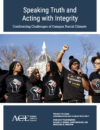Background | Projects | Research Team | Books & Reports | Events
Background
The Pullias Center is at the forefront of research aimed at developing innovative and effective campus leadership approaches with the goal to improve higher education. Our research and analysis on Shared Equity Leadership delves into how broadly inclusive and collaborative approaches to leadership are necessary to achieve equitable outcomes.
Campus leaders play critical roles in spearheading, facilitating and supporting systemic change efforts on their campuses. Their input and guidance are imperative to address the increasingly complex problems facing colleges and universities, such as avoiding and recovering from racial crises, diversifying STEM education, creating inclusive cultures and achieving equity goals.
Our rigorous, evidence-based research at the Pullias Center is aimed at supporting leaders in their efforts to create scalable, sustainable and systemic change that transforms institutions and achieves equity. Our research not only focuses on providing leaders with the solutions or “what” of change but also the “how” through our research of change and leadership processes.
Current Projects
 The Change Leadership Toolkit for Advancing Systemic Change in Higher Education
The Change Leadership Toolkit for Advancing Systemic Change in Higher Education
With funding from the Alfred P. Sloan Foundation and the Bill & Melinda Gates Foundation, this project seeks to understand how colleges and universities transform themselves to dramatically improve their performance and eliminate student success gaps by race and income, and translate that understanding into tools, methods and resources to help more colleges and universities transform for equitable student success.
 Shared Equity Leadership in Higher Education
Shared Equity Leadership in Higher Education
This multi-year research effort, in partnership with the American Council on Education (ACE), is aimed at developing practice-based insights relative to Shared Equity Leadership in higher education. The first report in the series, Shared Equity Leadership, Making Equity Everyone’s Work describes how broadly inclusive and collaborative approaches to leadership are necessary to achieve equitable outcomes. This research was supported by a grant from the Alfred P. Sloan Foundation.
In Organizing Shared Equity Leadership: Four Approaches to Structuring the Work, the second report in the series, we highlight four distinct ways to structure SEL that we observed from our participating institutions.
Reports released in 2022 and 2023 include topics such as Shared Accountability, Roles and Responsibilities, Capacity Building and Sharing Emotional Labor. This work between the two organizations is being supported by a grant from the Arthur Vining Davis Foundation.
Related & Past Projects
Confronting Challenges of Campus Racial Climate
A multi-year study focused on responses to campus racial crises and building institutional capacity for racial equity.
Speaking Truth and Acting with Integrity: Confronting Challenges of Campus Racial Climate
A report that explores what led to the University of Missouri’s 2015-16 racial crisis and how the institution has since responded, offering recommendations to college and university leaders who strive to create and maintain a positive racial climate on campus. Learn more about this project here.
Research Team
Adrianna Kezar
Director
Elizabeth Holcombe
Postdoctoral Research Associate
Books
 Shared Leadership in Higher Education: A Framework and Models for Responding to a Changing World
Shared Leadership in Higher Education: A Framework and Models for Responding to a Changing World
Eds. Elizabeth M. Holcombe, Adrianna J. Kezar, Susan L. Elrod, Judith A. Ramaley
Stylus Publishing, December 2021
Buy Now: Amazon
Today’s higher education challenges necessitate new forms of leadership. A volatile financial environment and the need for new business models and partnerships to address the impact of new technologies, changing demographics, and emerging societal needs, demand more effective and innovative forms of leadership. This book focusses on a leadership approach that has emerged as particularly effective for organizations facing complex challenges: shared leadership.

Administration for Social Justice and Equity
Julie Posselt and Adrianna Kezar
Routledge, 2019
Buy now: Amazon | Routledge
This book discusses the value of pursuing social justice for administrators in higher education in terms of achieving equity and empowerment.

Envisioning Public Scholarship for Our Time: Models for Higher Education Researchers
Eds. Adrianna Kezar, Joseph A. Kitchen, and Yianna Drivalas
Stylus Publishing, 2018
Buy now: Amazon | Stylus Press
This book proposes a new paradigm of public scholarship for our time, one that shifts from the notion of the public intellectual to the model of the engaged scholar.
Reports

Emotional Labor in Shared Equity Leadership Environments: Creating Emotionally Supportive Spaces
Darsella Vigil, Elizabeth Holcombe, Natsumi Ueda, Adrianna Kezar
Pullias Center for Higher Education (2023)
In this research brief, part of the On Shared Equity Leadership series, we explore what emotional labor looks like in environments where responsibility for DEI leadership is broadly distributed and shared across multiple campus stakeholders, rather than siloed or isolated in a single person or office. While the challenging emotions and emotional labor that accompany DEI work do not disappear in SEL environments, we did find some evidence that the burden is minimized by working in community with other leaders who share the labor. The emotional labor that does still occur is often less burdensome and overwhelming to those involved because of the support they have from colleagues who share both the work and the emotions that come with it. This report first summarizes some of the existing research on emotional labor and DEI work before highlighting the ways in which SEL can alleviate different types of emotional labor.
Categories: Shared Equity Leadership, Equity and Leadership
shared equity leadership adrianna kezar equity and leadership
Download 1.77 MB 21851 Downloads

Capacity Building for Shared Equity Leadership: Approaches and Considerations for the Work
Elizabeth Holcombe, Jordan Harper, Natsumi Ueda, Adrianna Kezar, Jude Paul Matias Dizon, Darsella Vigil
Pullias Center for Higher Education (2023)
This report, the fifth in the On Shared Equity Leadership series, explores ways to build capacity for the work of shared equity leadership (SEL) in higher education. SEL is a leadership approach that scales diversity, equity, and inclusion (DEI) work and creates culture change by connecting individual and organizational transformation. Capacity-building efforts help leaders develop a repertoire of knowledge, skills, and dispositions to collectively lead equity-minded change efforts on campus. To create environments where SEL can thrive, campuses need to build capacity for both shared leadership and DEI. This distinction is important because shared leadership capacity building involves working and leading collaboratively, whereas capacity building for DEI is more focused on the knowledge, skills, and critical consciousness necessary to make progress toward DEI-related goals. Additionally, capacity for SEL must be built at multiple levels—the personal or individual level, the collective or team level, and the organizational level. The report identifies distinct strategies for building capacity at each level and indicates whether they can build capacity for shared leadership, DEI, or both.
Categories: Equity and Leadership, Leadership
Equity & Leadership shared equity leadership equity and leadership leadership
Download 2.29 MB 12913 Downloads

Leading for Equity from Where You Are: How Leaders in Different Roles Engage in Shared Equity Leadership
Elizabeth Holcombe, Adrianna Kezar, Jordan Harper, Darsella Vigil, Natsumi Ueda, Jude Paul Matias Dizon
Pullias Center for Higher Education (2022)
In this report, the fourth in the On Shared Equity Leadership series, we describe the ways that leaders in different campus roles contribute to shared equity leadership (SEL) efforts. SEL is a leadership approach that scales diversity, equity, and inclusion (DEI) work and creates culture change by connecting individual and organizational transformation. Individuals embrace a personal journey toward critical consciousness to become equity-oriented leaders. Collectively, leaders embody a set of values and enact a set of practices that form new relationships and understandings, ultimately working to dismantle current systems and structures that inhibit equitable outcomes. This report examines roles from both a functional perspective (e.g., faculty, student affairs, and DEI-specific roles) and from a positional view (e.g., senior-level, mid-level, and ground- level leaders), and it highlights the ways in which different values and practices are especially important for leaders in particular roles.
Categories: Equity and Leadership, Leadership
shared equity leadership equity and leadership leadership
Download 2.08 MB 15374 Downloads

Shared Responsibility Means Shared Accountability: Rethinking Accountability Within Shared Equity Leadership
Adrianna Kezar, Elizabeth Holcombe, Darsella Vigil
Pullias Center for Higher Education (2022)
In this report, the third in the On Shared Equity Leadership series, we describe the ways that campuses implementing SEL are grappling with accountability in environments where responsibility for DEI work is broadly distributed. What does it mean when more people are in charge of accomplishing DEI goals? How do we effectively and honestly measure progress on DEI goals? How do we ensure we are measuring the right goals while simultaneously holding the right people accountable for advancing campus equity goals? This report examines these questions and more, providing many examples for campuses struggling to rethink their accountability systems as they broaden responsibility for DEI work.
Categories: Equity and Leadership, Leadership
shared equity leadership equity and leadership
Download 2.30 MB 18389 Downloads

Shared Equity Leadership Toolkit
Adrianna Kezar, Elizabeth Holcombe, Darsella Vigil
Pullias Center for Higher Education (2022)
This toolkit accompanies the report Shared Equity Leadership Making Equity Everybody’s Work, and enables leaders to reflect on their personal journey toward a critical consciousness. Through the SEL Toolkit, leaders can identify their own strengths and potential areas for growth in the values and practices that are necessary to effectively practice shared equity leadership. Leaders can assess and reflect on their strengths individually as well as map the strengths present in their team or group.
Categories: Equity and Leadership, Leadership
shared equity leadership equity and leadership
Download 781.70 KB 14696 Downloads

Organizing Shared Equity Leadership: Four Approaches to Structuring the Work
Elizabeth Holcombe, Adrianna Kezar, Jude Paul Matias Dizon, Darsella Vigil, Natsumi Ueda
Pullias Center for Higher Education (2022)
In this report, the second in the On Shared Equity Leadership series, we highlight four distinct ways to structure Shared Equity Leadership (SEL) that we observed from our participating institutions. We lay the groundwork for understanding these structures by first describing some of the more common or traditional ways that diversity leadership has been structured in higher education, followed by a brief overview of shared leadership structures and then a detailed analysis of the four SEL models. We conclude with examples that show how institutions can reward and incentivize the development of these models.
Categories: Equity and Leadership, Leadership
shared equity leadership equity and leadership
Download 942.10 KB 17210 Downloads

Shared Equity Leadership: Making Equity Everyone's Work
Adrianna Kezar, Elizabeth Holcombe, Darsella Vigil, and Jude Paul Mathias Dizon
Pullias Center for Higher Education (2021)
In this publication, the first in the “On Shared Equity Leadership” series, we describe how broadly inclusive and collaborative approaches to leadership are necessary to achieve equitable outcomes. We term this approach shared equity leadership (SEL), in which equity becomes everyone’s responsibility and multiple campus stakeholders collectively share leadership for equity. At the heart of shared equity leadership is the notion of personal journey toward critical consciousness, in which leaders develop or strengthen a commitment to equity through their identity, personal experiences, or relationships and learning. Leaders' personal journeys help them develop the values necessary to share leadership for equity, as well as carry out the practices that enact this type of leadership. These values and practices are embodied and enacted by leaders collectively.
Categories: Equity and Leadership, Guides
policymaking equity and leadership
Download 2.31 MB 15580 Downloads

Speaking Truth and Acting with Integrity: Confronting Challenges of Campus Racial Climate
Adrianna Kezar and Sharon Fries-Britt (2018)
Confronting Challenges of Campus Racial Climate is a multi-year study focused on responses to campus racial crises and building institutional capacity for racial equity. The study is a collaboration between the Pullias Center, the American Council on Education (ACE), and the University of Missouri.
This report explores what led to the University of Missouri’s 2015-16 racial crisis and how the institution has since responded, offering recommendations to college and university leaders who strive to create and maintain a positive racial climate on campus. Note: This document is hosted on the ACE website.
Categories: Institutional Culture, Student Success
ACE administrator adrianna kezar DEI diversity institutional change institutional culture leadership lorelle espinosa student success
Download 1.39 MB 17482 Downloads

Shared Leadership in Higher Education: Important Lessons from Research and Practice
Adrianna Kezar and Elizabeth Holcombe (2017)
An American Council on Education report that argues shared leadership consistently emerges as a key factor for organizations that were best able to learn, innovate, perform and adapt to the types of external challenges that campuses now face.
Categories: Institutional Culture
institutional culture leadership
Download 1.41 MB 19901 Downloads
Papers and other publications
Wheaton, M. M., & Kezar, A. (2018). Interlocking systems of oppression: Women navigating higher education leadership. In H. Schnackenberg, & D. Simard (Eds.), Challenges and opportunities for women in higher education leadership (pp. 61-83). Hershey, PA: IGI Global.
Kezar, A., Avilez, A., Drivlas, J., & Wheaton, M. (2017). Building social change oriented leadership capacity among student organizations: Developing students and campuses simultaneously. In D. M. Rosch (Ed.), The Role of Student Organizations in Developing Leadership, New Directions for Higher Education, 2017(155), 45-57.
Kezar, A., & Wheaton, M. (2017). The value of connective leadership: Benefiting from women’s approach to leadership while contending with traditional views. About Campus, 21(6), 19-26.
Kezar, A., & Lester, J. (2014). Building STEM faculty leaders on campus. Journal of Leadership Studies, 8(1), 57-62.
Elrod, S., & Kezar, A. (2014). Developing leadership in STEM fields: The PKAL summer leadership institute. Journal of Leadership Studies, 8(1), 33-39.
Kezar, A., & Maxey, D. (2014). Collective action on campus toward student development and democratic engagement. In C. J. Broadhurst & G. L. Martin (Eds.), “Radical Academia”? Understanding the climates for campus activists, New Directions for Higher Education, 2014(167), 31-41.
Kezar, A. (2014). Women’s contributions to leadership and the road ahead. In K. A. Longman & S. R. Maden (Eds.), Women and leadership in higher education (pp. 117-134). Charlotte, NC: Information Age Publishing.
Kezar, A., & Gerhke, S. (2014). Grassroots leadership: Responding to declining shared governance in the neoliberal world. In L. Qi & C. Gerstl-Pepin (Eds), Survival of the fittest: The shifting contours of higher education in China and the United States (pp. 101-120). Heidelberg, DE: Springer-Verlag.
Kezar, A. J. (2012). Shared leadership for creating campus cultures that support students of color. In S. Museus & U. M. Jayakumar (Eds.), Creating campus cultures: Fostering success among racially diverse student populations (pp. 150-167). New York, NY: Routledge Press.
Lester, J., & Kezar, A. (2012). Understanding the formation, functions, and challenges of grassroots leadership teams. Innovative Higher Education, (37)2, 105-124. Kezar, A. (2011). Faculty and staff grassroots leaders’ beliefs about power: Do their beliefs affect their strategies and effectiveness? International Journal of Leadership Studies, 6(1), 84-103.
Kezar, A., & Lester, J. (2011). Enhancing campus capacity for leadership: An examination of grassroots leaders in higher education. Redwood City, CA: Stanford University Press.
Kezar, A. (2011). Leading bottom up change: Encounters with power and oppression. International Journal of Qualitative Studies in Education, 24(4), 1-31.
Kezar, A., & Lester, J. (2010). Breaking the barriers of essentialism in leadership research: Positionality as a promising approach. Feminist Formations, 22(1), 163-185.
Kezar, A., & Lester, J. (2009). Supporting faculty grassroots leadership. Research in Higher Education, 50(7), 715-740.
Kezar, A. (2009). Leadership development on campuses within the new corporate marketplace. In J. Knapp & D. Siegel (Eds.), The business of higher education (pp. 53-78). Westport, CT: Praeger Press.
Kezar, A. (Ed.). (2009). Rethinking leadership in a complex, multicultural and global environment. Sterling, VA: Stylus Publishing.
Kezar, A. & Beesmeyer, L. (2009). Reflections on the leadership marketplace. In A. Kezar (Ed.), Rethinking leadership practices in a complex, multicultural and global environment (pp. 233-238). Sterling, VA: Stylus Publishing.
Kezar, A. (2008). Understanding leadership strategies for addressing the politics of diversity. The Journal of Higher Education, 79(4), 406-441.
Kezar, A., Eckel, P., Contreras-McGavin, M., & Quaye, S. J. (2008). Creating a web of support: An important leadership strategy for advancing campus diversity. Higher Education, 55(1), 69-92.
Kezar, A., Lester, J., Glenn, W., & Nokamato, J. (2008). Examining organizational contextual features that affect implementation of equity initiatives. The Journal of Higher Education, 79(2), 125-159.
Kezar, A., & Lester, J. (2008). Leadership in a world of divided feminism. NASPA Journal About Women in Higher Education, 1(1), 51-75.
Kezar, A. (2007). Tools for a time and place: Phased leadership strategies to institutionalize a diversity agenda. TheReview of Higher Education, 30(4), 413-439.
Kezar, A. (2007). Learning from and with students: College presidents creating organizational learning to advance diversity agendas. NASPA Journal, 44(3), 578-609.
Kezar, A. & Eckel, P. (2007). Learning to ensure the success for students of color: A systemic approach to effecting change. Change: The Magazine of Higher Education, 39(4), 18-21.
Kezar, A., & Carducci, R. (2007). Cultivating revolutionary educational leaders: Translating emerging theories into action. Journal of Leadership Development, 2(1), 1-46.
Kezar, A., & Eckel, P. (2005). Important journeys: Presidents supporting students of color. Washington, DC: American Council on Education.
Kezar, A. (2006). Rethinking public higher education governing boards performance: Results of a national study of governing boards in the United States. The Journal of Higher Education, 77(6), 968-1008.
Kezar, A. (2000). Pluralistic leadership: Incorporating diverse voices. The Journal of Higher Education, 71(6), 722-743.
Kezar, A., & Gangone, L. (2000). Meeting the leadership challenges of the 21st Century: An evaluation of a national leadership institute. Initiatives, 59(4).
Kezar, A. (2000). Pluralistic leadership: Bringing diverse voices to the table. About Campus, 5(3), 6-11.
Kezar, A. (1998). Exploring new avenues for leading community colleges: The paradox of participatory models. Community College Review, 25(4), 75-87.
Events
No events scheduled at this time.
